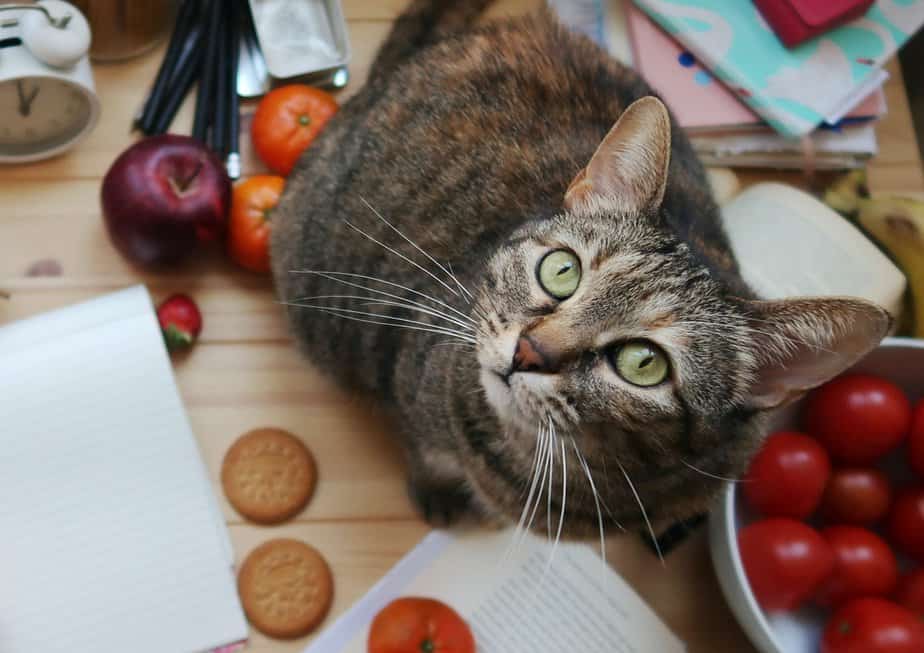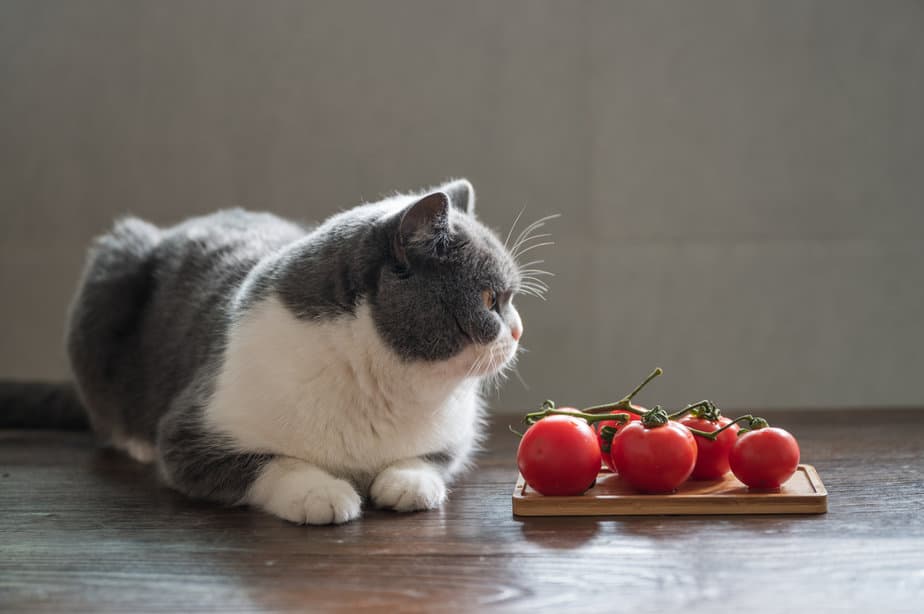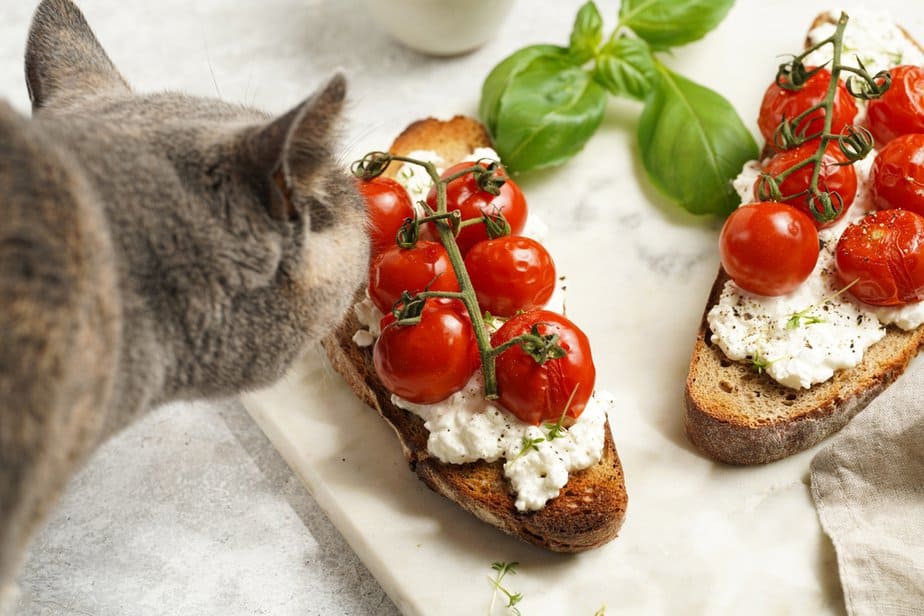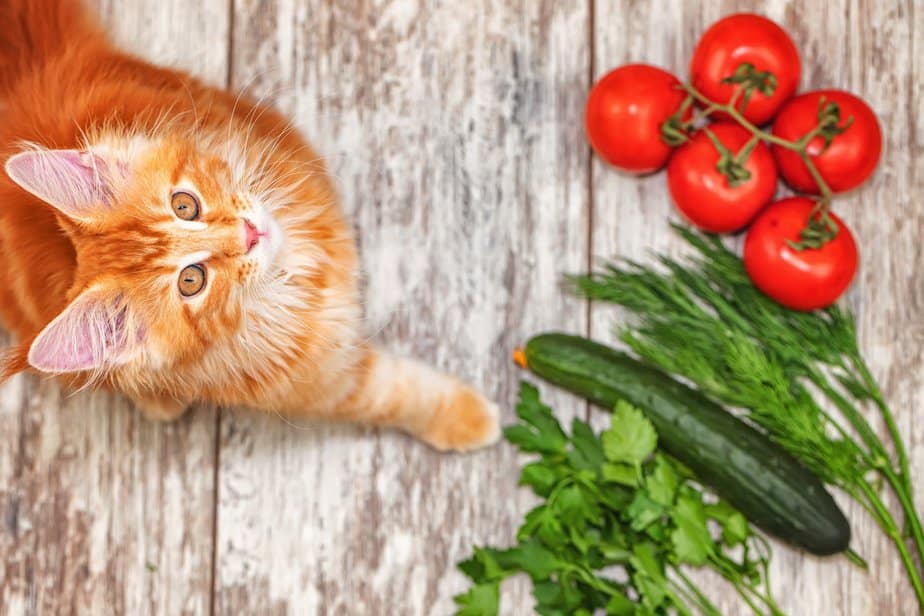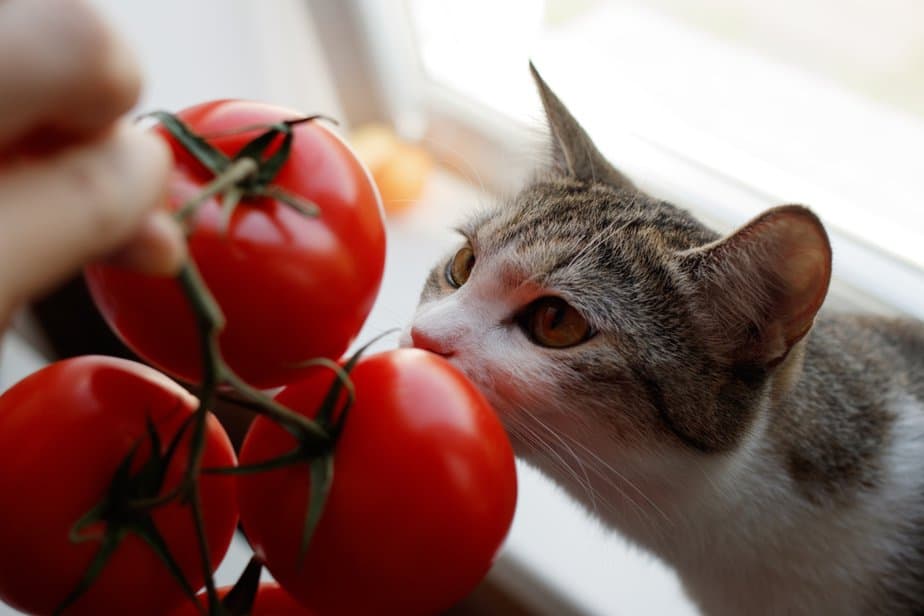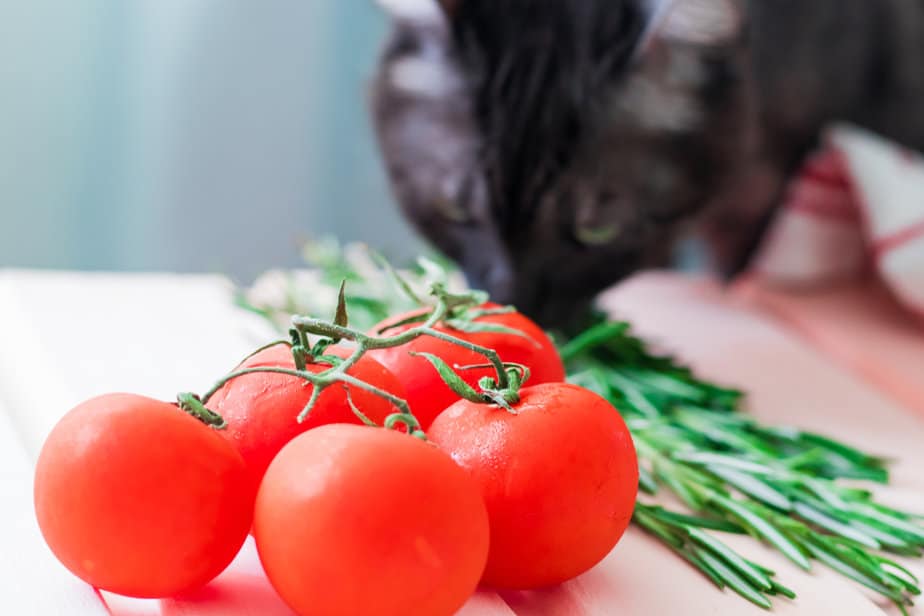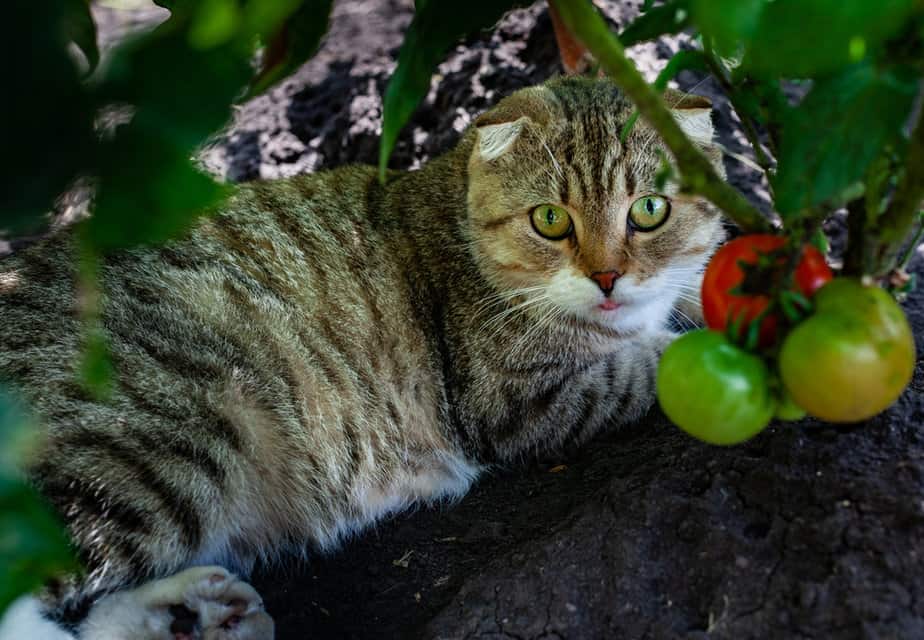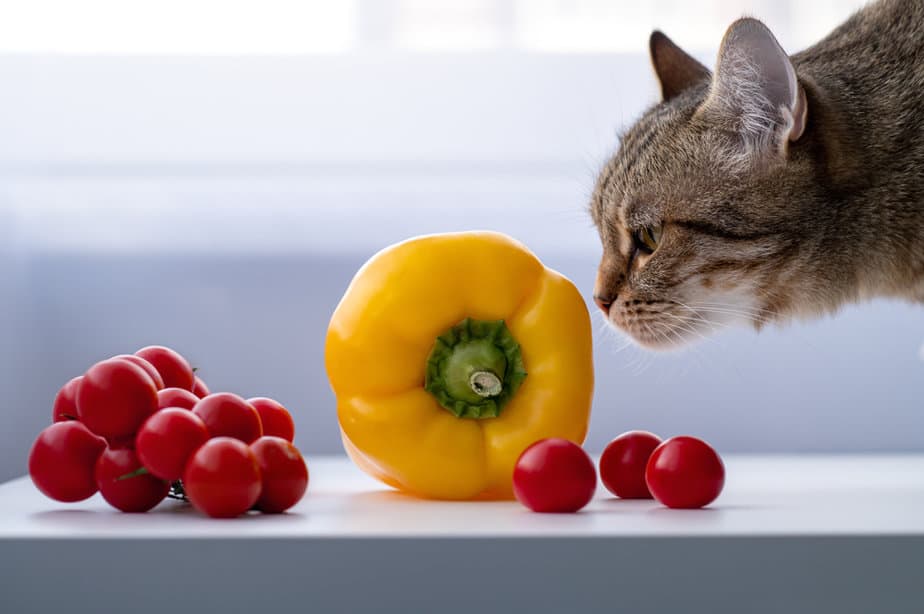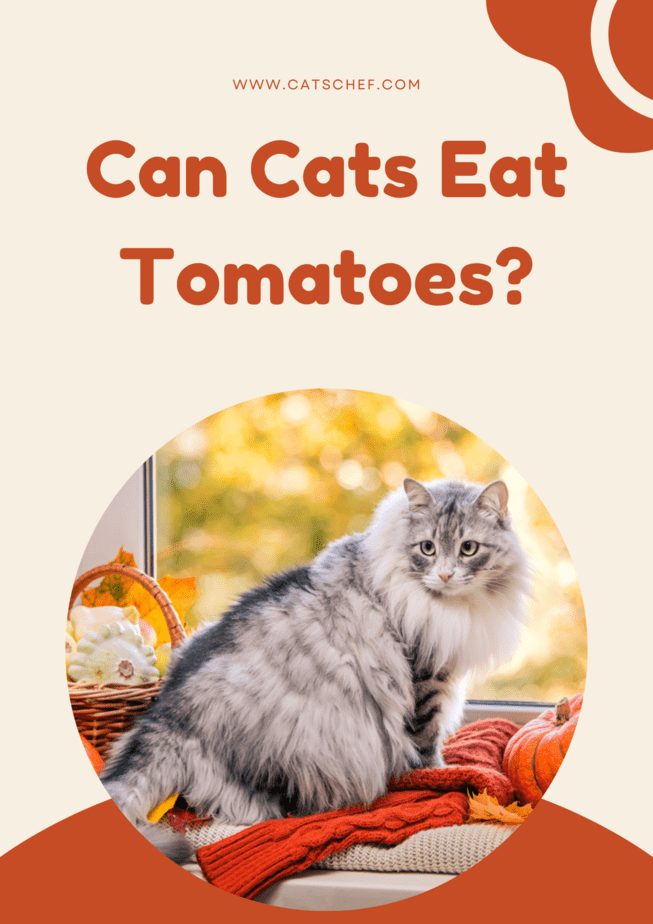📖 Table of Content:
“Can cats eat tomatoes?” Never in your life have you thought you would be the one to ask this question, especially considering your curious creature’s obsession with meat. She’s been munching on pretty much every type of meat she can get her paws on, but tomatoes?!
Suddenly, you’re noticing she’s sniffing around your garden looking at your tomatoes (waiting for them to ripen, maybe?). She’s giving them a little push with her paw, walking around them as if she’s waiting for them to move, and checking whether she can give them a little bite.
She’s CLEARLY bored with her regular cat food. But, you can‘t get over the fact that she’s interested in a vegetable? Your precious purrincess that doesn’t want to eat anything unless it’s made with chicken or beef? Your munchkin that gets diarrhea every time she nibbles on cheese?
How can you feed your cat tomatoes when she hasn’t even gotten over munching on human foods? Can cats even eat tomatoes? Can they eat every part of the tomato plant? What about veggies in general?
Actually, you might have saved your cat an emergency vet visit when you decided to hop online and look for some answers. According to our friends over at the ASPCA (American Society for the Prevention of Cruelty to Animals), cats can’t REALLY eat tomatoes.
Tomatoes (well, certain parts of the tomato) contain compounds that can cause harm to your cat’s health. So, you shouldn’t feed tomatoes to your cat unless you’re 100% sure you know what you’re doing (and you consulted with your vet).
What are tomatoes?
Have you been living under a rock for the entirety of your life? We‘re guessing your answer‘s “No.“ And, we‘re guessing you‘ve stumbled upon a tomato or two and been asked to share your opinion on the “are tomatoes fruits or vegetables?” debate.
Here’s the thing, tomatoes are both and you’re wrong to think otherwise. Tomatoes are fruits that are typically considered vegetables by nutritionists. Tomatoes are ripened flowers with seeds. But, they aren’t sweet and they don’t contain as much fructose as some other fruits.
That’s where the confusion comes from – tomatoes have the properties of both veggies and fruits and nobody’s sure whether they’re one or the other. But, cats don’t really care about labels as long as they don’t get in the way of them munching on whatever food’s in question.
Anyway, tomatoes (Solanum Lycopersicum, for those of you who are looking to be more technical) are pretty great. They come from the nightshade family that‘s native to South America but they grow pretty much everywhere in the world.
They’re packed with vitamins, minerals, and antioxidants. They’re great for boosting your immune system, maintaining the proper function of your nervous system, and ensuring the health of your digestive system. They have pretty much every system covered… For humans.
Our feline friends can’t reap the same benefits considering the harmful compounds we mentioned a couple of paragraphs ago. Commercial cat food doesn’t contain tomatoes for a reason.
Can cats eat tomatoes?
Our friends over at the ASPCA don’t recommend feeding tomatoes to your cat because of numerous reasons. Certain parts of the tomato plant contain compounds that can cause harm to your cat’s health. So, it’s better to avoid tomatoes altogether than to suffer the consequences.
And, we can‘t forget about the fact that tomatoes aren’t a natural part of your cat’s diet. Cats are carnivores which means they require meat, animal protein, and animal nutrients in their diets to survive and thrive.
They don’t require fruits, veggies, and whole grains the same way humans do. They don’t even possess the enzymes necessary to break down and process most foods humans eat regularly. Tomatoes are great, but they’re not ALWAYS great for your cat.
Ripe red tomatoes are perfectly safe for your four-legged friend, but unripe tomatoes aren‘t. Other parts of the tomato plant (root, stem, leaves) aren‘t safe, either. Sure, “sharing is caring”, but you shouldn’t share everything you eat with your furry friend before you consult with your vet.
Before the two of you head off to the nearest Trader Joe’s to get some organic, crème de la crème tomatoes, you might want to throw a glance a what to expect when you feed tomatoes to your feline friend.
What’s good about tomatoes?
For humans!? Everything! For cats?! Definitely not as much, but we can‘t say that ripe tomatoes don’t do their best at providing your four-legged friend with a bunch of vitamins, minerals, and antioxidants.
Starting with vitamins, a bite or two of tomato flesh can provide your feline friend with vitamin A, vitamin C, and vitamin K. These vitamins are a great aid when it comes to ensuring your cat’s health – vitamin A muscles, bones, and teeth, vitamin C for the immune system, and vitamin K for healthy blood.
Moving on to minerals, a nibble of tomato flesh can provide your furry friend with potassium, magnesium, manganese, and calcium. These minerals ensure the proper function of your cat’s heart, liver, and kidneys. And they maintain the health of your cat’s muscles, bones, and teeth.
Last but not least, we can‘t forget about antioxidants. Antioxidants are SUPER important because most (wild and not-so-wild) cats get their nutrients from their prey (which doesn’t necessarily have any antioxidants).
And, tomatoes just happen to be a great source of lycopene which can help your cat lower the risk of heart disease and cancer. Tomatoes are starting to seem too good to be true, which means it’s time to throw a glance at some of the tomatoes‘ dark sides.
What’s bad about tomatoes?
For cats? The list seems to be getting bigger and bigger as you dig deeper and deeper. Where do we even start – tomato allergies, tomato plant poisoning, tomatine, and solanine?! We’re starting to think you’re about to understand the “cats can’t eat tomatoes” rant from the beginning of the article.
To your cat’s (and everyone else’s) demise, tomatoes aren’t as gentle on your cat’s digestive system as we assumed. Feeding small quantities of the WRONG tomato (green tomato, we‘re looking at you!) can cause a bunch of digestive problems and other health problems to your precious pet.
And don‘t even get me started on feeding large amounts of the RIGHT tomato to your cat because that can also cause problems. When you’re planning on feeding ANY type of tomato to your cat you have to make sure you know what you’re doing.
But, here’s what to expect when you don’t.
1. Tomato allergy
Yes, your furry friend can be allergic to tomatoes and that’s why you should never feed ANYTHING to her before you consult with your vet. You don‘t know how severe her symptoms can get. And, you certainly don’t want her to experience them to find out.
But, on the off chance that your four-legged friend does eat the wrong tomato (or the wrong part of the tomato), you might want to keep an eye out for some of the most common symptoms.
Anything ranging from nausea, vomiting, and diarrhea, to weakness, loss of coordination, loss of appetite, and gastrointestinal upset should be a good enough reason to contact your vet. Tomato allergies aren‘t fatal, but it’s better to be safe than sorry.
2. Tomato plant poisoning
“Can cats eat tomatoes?”, more like “Can cats contract a deadly tomato plant poisoning from eating the wrong part of the tomato plant?” Because the answer’s a hundred times YES, cats can get seriously sick from eating an unripe tomato or pretty much any part of the tomato plant.
You see, green tomatoes and green parts of the tomato contain compounds known as solanine and tomatine. These compounds are EXTREMELY poisonous to cats and can cause a bunch of digestive and health problems when consumed.
Some of the most common symptoms of tomato plant poisoning are excessive thirst and urination, excessive salivation, loss of appetite, loss of coordination, extreme stomach upset, diarrhea, and vomiting.
Severe symptoms are heart rate changes, behavior changes, depression of the nervous system, and physical weakness. Sure, ingestion of the unripe fruit doesn’t always cause severe symptoms. But, who’s to say your feline friend’s going to be an exception?
Contact your vet THE MOMENT that you notice any of these symptoms. They should be able to induce vomiting to get rid of these toxins, provide your feline friend with proper supportive care, and supply her with a generous amount of electrolytes and fluids.
Can cats eat ripe tomatoes?
Yes, cats can eat ripe tomatoes! That’s pretty much the only type of tomatoes cats can eat without any repercussions. Ripe tomatoes (or red tomatoes) don’t contain the same compounds other parts of the tomato plant contain.
Ripe tomatoes can be a great pick-me-up because they’re packed with vitamins, minerals, and antioxidants. So, on the off chance that your furry friend can’t live without an occasional tomato, that‘s the one you should look for at the nearest Trader Joe’s.
Can cats eat unripe tomatoes?
No, cats can’t eat unripe tomatoes! Unripe tomatoes contain compounds solanine and tomatine that are EXTREMELY poisonous to cats. Consuming unripe tomatoes (or parts of the tomato plant) can cause tomato plant poisoning.
And trust me, you don’t want your precious purrincess experiencing ANY symptoms of tomato plant poisoning. You’re better off finding her a hobby that doesn’t include running through your tomato garden.
Can cats eat cherry tomatoes?
Cherry tomatoes are pretty much the same as regular tomatoes, they’re just smaller and cuter. So, cats can eat ripe cherry tomatoes. But, they should steer clear of the unripe ones and the cherry tomato plant.
But, there’s always something better to munch on that doesn’t include a bunch of side effects and adverse reactions. Next time your cat’s meowing and purring to let her take a bite, try giving her a zucchini or a cucumber and see what happens.
Can cats eat tomato sauce, tomato soup, or tomato juice?
Short answer – NO, cats can‘t eat any of these tomato products. Long answer – tomato sauce, tomato soup, and tomato juice contain a bunch of other ingredients that can cause harm to your cat’s health.
We’re talking about salt, seasonings (garlic powder, onion powder, chili pepper, cayenne pepper, black pepper), additives, and preservatives. Trust me, you don’t want these ingredients anywhere near your precious purrincess.
Can cats eat ketchup?
Cats can’t eat ketchup so snatch that pizza out of your cat’s paws before it’s too late! Same as with other tomato products, ketchup contains a bunch of ingredients that can cause harm to your four-legged friend (even more than the tomato itself).
Trust me, you don’t want your furry friend munching on onion or garlic. And, don’t even get me started on Xylitol and other sweeteners (completely unnecessary). Your cat’s better off chewing on something that won’t send her to the emergency animal center.
Conclusion
Our friends over at the ASPCA don’t recommend feeding tomatoes to your cat FOR A GOOD REASON. Ripe tomatoes are pretty great, but unripe tomatoes can cause harm to your cat’s health as they’re EXTREMELY poisonous. And, same goes for other parts of the tomato plants.
Are the risks worth the benefits? We don‘t think that but feel free to consult with your vet and draw your own conclusions.
